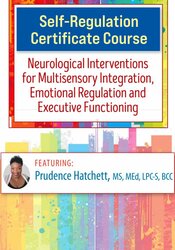

Regulation is the key to paying attention, active participation, and learning. But getting kids with autism, sensory processing disorder, and ADHD regulated requires specialized knowledge and skills!
To effectively address challenging behaviors like hyperactivity, aggressiveness, self-stimulation, and inattentiveness in children and adolescents, it’s essential to know the underlying brain processes and how to intervene accordingly.
Watch self-regulation expert, special educator, and counselor, Prudence Hatchett, MS, Med, NCC, LPC-S, BC-TMH, for this advanced training and learn the connection between neuroscience and self-regulation to help you select and develop effective self-regulation interventions.
Under Prudence’s expert guidance, you will learn proven neurologically tailored sensory strategies, environmental modification, and emotional regulation strategies, as well as mindfulness, social skills programs, and music and movement to improve regulation.
By learning how to skillfully integrate these strategies you will be able to:
Whether you are an expert on the brain or new to this science, Prudence makes it easy to understand and easy to implement!
Purchase today!
Planning Committee Disclosure - No relevant relationships
All members of the PESI, Inc. planning committee have provided disclosures of financial relationships with ineligible organizations and any relevant non-financial relationships prior to planning content for this activity. None of the committee members had relevant financial relationships with ineligible companies or other potentially biasing relationships to disclose to learners. For speaker disclosures, please see the faculty biography.
Continuing education credit information is coming soon for this non-interactive self-study package.
CE hours may be available for select professions, as listed in the target audience. Hours will be dependent on the actual recording time. Please check with your state licensing board or organization for specific requirements.
There may be an additional fee for CE certificates. Please contact our Customer Service at 1-800-844-8260 for more details.
**Materials that are included in this course may include interventions and modalities that are beyond the authorized practice of your profession. As a licensed professional, you are responsible for reviewing the scope of practice, including activities that are defined in law as beyond the boundaries of practice in accordance with and in compliance with your professions standards.

Prudence Hatchett, MS, MEd, LPC-S, BCC, is a dedicated and multifaceted mental health professional with over 14 years of experience in behavioral health, education, and mental wellness. As a National Certified Counselor (NCC), Licensed Professional Counselor (LPC), Board Certified Telemental Health Provider (BC-TMH), and Advanced Certified Autism Specialist (ACAS), she brings a wealth of expertise to her trainings.
Prudence holds an MEd in counselor education and a master-level emotional disability endorsement from the University of Mississippi, alongside an MS in special education and a BA in psychology from Mississippi State University. She is also certified as a Clinical Anxiety Treatment Professional (CCATP) and holds Key Leadership Skills Certification (KLSC), enhancing her approach to client care and leadership.
Prudence is the owner of PH Counseling, LLC, which offers counseling, coaching, and online courses, as well as the author of Behavior is Not a Destination, It’s a Process, a practical guide to behavior management. Additionally, she is a positive lifestyle writer, with published articles, blogs, and poems to further support her mission to empower others.
Speaker Disclosures:
Financial: Prudence Hatchett is the owner of PH Counseling, LLC. She receives royalties as a published author. She receives a speaking honorarium from PESI, Inc. She has no relevant financial relationships with ineligible organizations.
Non-financial: Prudence Hatchett has no relevant non-financial relationships.
Access never expires for this product.
Visit our FAQ page at www.pesi.com/faq or contact us at www.pesi.com/info
Satisfaction Guarantee
Your satisfaction is our goal and our guarantee. Concerns should be addressed to: PO Box 1000, Eau Claire, WI 54702-1000 or call 1-800-844-8260.
ADA Needs
We would be happy to accommodate your ADA needs; please call our Customer Service Department for more information at 1-800-844-8260.
PESI Mobile App
Access CE trainings on your phone or tablet through our free mobile app. Choose video or audio-only versions of online courses from the world’s best instructors, and complete your CE requirements anywhere, anytime, at your own pace.
Please wait ...